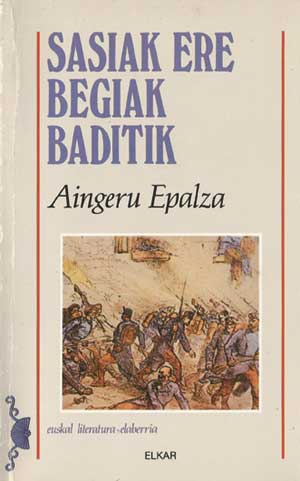
Pamplona only
- Aingeru Epaltza The bush also has eyes Elkar, 1986
Aritz Galarraga
2015eko uztailaren 01

Well, dear Counterparts, a nightmare more terrible than the appointment of mayor of Asuncion: for example, the one who lived the baztans Pedro Mari Arrieta as Head of City, when they discovered the pastiza. Until then, kalma. By a strange carambola, he became a simple soldier in Carlist troops, an illustrious lieutenant, after a battle, with the liberals. This, then, Pamplona, in what it had become: “Don Kaxildo spoke to us in his sermons of all that we had seen was like Jerusalem and Babylon.” Everything new, everything wonderful, everything pleasing to the spirit. And for the body, like visits to the cantina Escalapoina de Oro. Who will be surprised after this? “I didn’t know a more wonderful place than Pamplona.”
But there is no happiness that lasts for a hundred years – and fortunately, no rotten foral regiment. “It was beautiful to be lieutenant Torres!” However, they will catch him because of the small amount of money left behind in the strange carambola: “I still don’t know if you’re a lucky idiot or a dog more than ever.” And perhaps Arrieta would have a tired ancestor, because he managed to escape again, in this case since it is believed to be the historic capital of Euskal Herria. “At that time I was cured by the comedian chip of a bad theater.”
Although the passages we are told belong to the end of the First Carlist War, as the author tells us with some explanations, a grotesque sense of humor runs through the entire book. Many examples could be brought, but, for example, I smiled, at first, when Zumalacárregui died in three years, when Arrieta yells “Don Tomás Zumalacárregui, be our boss!”, at the height of Arrieta, who appears to them I don’t know what new general. However, the story has a little more reflection, for example, that of war, the Carlists clear, I guess not only: “I’ve been in bad luck for fifteen years from one side to the other for a revolution,” or “at the end of the war you come home (…) if you’re lucky, I take everything you have, but also what you’ve brought out.” The novel seemed to me a compliment so that Aingeru Epaltza was still the first of a young man.
Literary prize of the City of Pamplona of 1985, an award that once disappeared from the hand of those who mix the nightmare and the dream. And as I am sure there will also be young Epaltza, what better than if new generations of Basque writers emerged with the new municipal government, besides Epalza, from that city which is also that of Alonso, Aranbarri, Lizarralde.